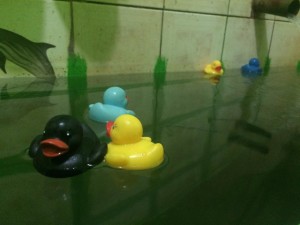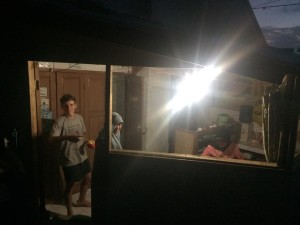Before deciding to join the Little Fireface Project, my main focus of research was on diurnal primates. This meant waking up at 4am, following monkeys until 5 or 6pm (depending on the season), hiking home, eating dinner, going to bed between 8 and 10 pm, and repeating it all the next day. This schedule felt rather natural, but didn’t leave much time for getting any alternative work done. Weekly schedules would require a full day off of observations in order to do other tasks, like entering and editing data, stocking up on food supplies, equipment repairs or processing samples. When I entered the world of nocturnal research, my circadian rhythms were literally turned upside down.
Now, my daily schedule consists of nightly observations between 5pm to 5am, going to bed around 6am, waking up between 12 and 1pm, and then having an average of 5 hours daily to get all those alternative tasks done. It keeps my days rather consistent, but it was no small feat to get to this stage. When I first started nocturnal research, I simply couldn’t sleep. I was naturally waking up at 8am when I had only gone to bed 2 hours earlier. It took about 2-3 weeks of physical exhaustion from not sleeping enough to kick into the night-life, mentally and physically. Over time, I’ve acquired my own routine that helps me stay in a consistent rhythm. Here are a few tips I find helpful in getting into, and maintaining, a healthy nocturnal work life:
- Keep the thermos filled with hot water at all times! I find a cup of coffee or tea accompanying me in the field helps at night. While too much caffeine might make you crash (and the majority of the team here has seen me go through a serious caffeine addiction, averaging 8 cups a day), a few cups during the later hours of the day can help, when it’s dark out and your body thinks it is time to sleep. I’ve almost entirely kicked coffee out of my routine now and I already feel my energy has more than doubled, but I won’t give up my night tea.

2. Cold mandi: A cold shower in the morning works better than coffee! Why? Because a cold shower wakes up all of your muscles. It sounds crazy, but you get used to it quickly. Cold showers dilate your capillaries and get your blood circulating to your extremities, stimulates your metabolic rate, boosts blood glucose, and increases your immune system.

3. Bubur o’clock: this has become a bit of a house tradition. As most of us are on a nocturnal clock here, those who aren’t on the late night shift will join those who just returned from observations to our neighbor Ibu’s shop for our favorite traditional breakfast dish; bubur. Bubur is a rice porridge commonly served with either chicken, eggs or peanuts. It’s a nice team bonding time as well, and whoever just came back from observations will update the others on what their focal loris was up to that night.

Side note: we have also just learned that the village bubur is most commonly used as baby food. This has had no influence on our routine, and we proudly wait in line with the infants, awaiting our rice porridge goodness.
4. In-flight ear buds and eye mask(s): as many of you may have read in previous blogs, we live directly across the street from the village mosque. The first call to prayer is at 4:30am, and then again at 7am, etc, etc. When you are trying to sleep in, those free in-flight ear buds that your airline gave you will become your best friend. Also, your body’s internal clock is sensitive to light, so in-flight eye masks come in handy too when you need to sleep through the sun that is creeping into your room.
5. Off-day exercise: Our job is literally to hike a mountain every day. It’s always nice to do something leisurely for yourself on off days – from something as small as enjoying a hot chocolate on the couch to going into town for lunch—but if I want to sleep later in the day, I still need to do some form of exercise or I am just too wired with energy to sleep. Sometimes I go out to the field to practice photography, some of our volunteers will go play Frisbee on the football field, but some weeks we all need our off-day to catch up on data entry or writing up our research. On days like this, even a small house “planks and squats” workout or “DG’s wicked workout” is enough to do the job in 30 minutes, so we can power through our desk work. And once again, it also serves as team (ab) building!
6. On busier weeks where I need to do diurnal work like vegetation plots or phenology monitoring on top of my nocturnal work, I sleep at strange hours of the day, between 2 and 10 pm. It can be hard to sleep during the mid-day when everyone else is awake and buzzing with energy, and this is when Spotify and Celestial Seasonings tea step up to the plate. There are different playlists under the theme of “sleep” people have created on Spotify, and you can find a playlist that works for you. I usually down a mug of ‘sleepytime tea’ and put on a playlist of rainstorms, and I’m out like a light.
These are just a few personal tips I find helpful to stay energized during my work hours. Everyone finds their own routine that works for them, but I hope these can help ease the transition for anyone considering or preparing to embark the realms of nocturnal fieldwork!
- Katie Reinhardt, PhD Student
